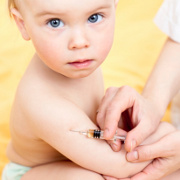 Photo: Getty Images
Photo: Getty Images
In addition to genetics and metabolism, mercury exposure and vaccines have been implicated as a possible cause of autism. My previous article covered studies about genetic and metabolism causes and this article continues with research regarding vaccines.
Old style DPT vaccines used to contain thimerosal, a 49 percent mercury compound. Some DTaP vaccines still contain small amounts of mercury, according to the CDC Pink Book. Other vaccines, such as Hepatitis B and flu shots contain the full amount of thimerosal.
Some researchers believe that the increasing number of vaccines given at one time to a developing infant are a cause of autism, particularly as the blood/brain barrier is not yet complete.
A study in the Annals of Epidemiology found that newborn boys who had received Hepatitis B vaccine were three times more likely to be diagnosed with an ASD compared with boys who hadn’t had the jab.
"Findings suggest that U.S. male neonates vaccinated with hepatitis B vaccine had a 3-fold greater risk of ASD; risk was greatest for non-white boys." (2)
Autism symptoms and mercury poisoning symptoms are virtually identical. The Journal of Immunotoxicology wrote:
"Autistic brains show neurotransmitter irregularities that are virtually identical to those arising from mercury exposure. Due to the extensive parallels between autism and mercury poisoning, the likelihood of a causal relationship is great."
These neurotransmitter irregularities may be the reason why some autistic children have sensory processing disorders. (1)
MMR Vaccine
MMR vaccine is considered a possible cause of autism. In 1998 a gastroenterologist called Andrew Wakefield and his team of clinicians identified 12 children, eight of whom suffered regressive autism and gastrointestinal disease. After publishing this case paper, concluding that it did NOT prove an association with MMR, Dr. Wakefield studied a further 161 children, 91 of whom had bowel disease and a further 70 who did not.
He found measles virus in the guts of 75 of the children with bowel disease and only in five of the healthy children. He called this condition "measles enterocolitis". It was already widely known that wild measles virus can cause colitis so theoretically a live virus vaccine like MMR could do the same. (3 and 4)
A further three children with regressive autism were found to have measles vaccine virus in their cerebrospinal fluid after a spinal tap had been performed.
"In light of encephalopathy presenting as autistic regression (autistic encephalopathy, AE) closely following measles-mumps rubella (MMR) vaccination, three children underwent cerebrospinal fluid (CSF) assessments including studies for measles virus (MV). All three children had concomitant onset of gastrointestinal (GI) symptoms and had already had MV genomic RNA detected ... None of the cases or controls had a history of measles exposure other than MMR vaccination."
They thought this raised the possibility of virally-driven brain damage resulting in some cases of regressive autism. (5)
Early life exposure to mercury and other metals, followed by exposure to live viruses could potentially tip the child into autoimmunity.
Fetal Tissue
Some vaccine viruses are cultured on fetal tissue cells obtained from aborted fetuses. Although it isn’t an added ingredient, trace amounts of fetal DNA will remain in the vaccine. Vaccines that contain fetal DNA include MMR, varicella, some Hepatitis B vaccines and Hepatitis A.
Children can produce antibodies to all components of vaccines and not merely the viruses or bacteria, so injecting fetal DNA can cause the child to develop antibodies to human tissue, another possible factor in autism.
Doctors in Portugal blood tested 171 autistic patients, 191 parents and 54 healthy people and found that the autistic patients had high levels of non-inherited antibodies to their own brain tissue. (6)
Spikes in the incidence of autism were seen in the UK in 1988 when the MMR was introduced and in the United States in 1995 when varicella vaccine was introduced, pointing to a possible link with fetal tissue in vaccines. (1)
It is important that research into the childhood vaccination schedule be continued, particularly while rates of autism show no sign of slowing down.
Sources:
1. Theoretical aspects of autism: Causes—A review, Journal of Immunotoxicology. Web. 8 September 2011.
http://www.cogforlife.org/ratajczakstudy.pdf
2. Hepatitis B Vaccination of Male Neonates and Autism, Annals of Epidemiology. Web. 8 September 2011.
http://www.annalsofepidemiology.org/issues
3. Measles study raises bowel disease link, BBC News (2002). Web. 8 September 2011.
http://news.bbc.co.uk/1/hi/health/1803005.stm
4. Enterocolitis, autism and measles virus, Molecular Psychiatry. Web. 8 September 2011.
http://www.ncbi.nlm.nih.gov/pubmed/12142948
5. Detection of Measles Virus Genomic RNA in Cerebrospinal Fluid of Children with Regressive Autism: a Report of Three Cases, Journal of American Physicians and Surgeons. Web. 8 September 2011. http://www.jpands.org/vol9no2/bradstreet.pdf
6. Autoantibody repertoires to brain tissue in autism nuclear families, Journal of Neuroimmunology. Web. 8 September 2011.
http://www.sciencedirect.com/science/article/pii/S0165572804001213
Joanna is a freelance health writer for The Mother magazine and Suite 101 with a column on infertility, http://infertility.suite101.com/. She is author of the book, 'Breast Milk: A Natural Immunisation,' and co-author of an educational resource on disabled parenting.
She is a mother of five who practised drug-free home birth, delayed cord clamping, full term breast feeding, co-sleeping, home schooling and flexi schooling and is an advocate of raising children on organic food.
Reviewed September 8, 2011
by Michele Blacksberg R.N.
Edited by Jody Smith





Add a Comment87 Comments
Clearly, you don't know what "clearly" means, or "truth" for that matter. If you have evidence for your ludicrous claims, please share. We're not the ones afraid of the truth.
September 10, 2011 - 6:24amThis Comment
Can you answer the questions I asked?
September 10, 2011 - 7:01amThis Comment
Anonymous, is steadily defending Big Pharma, must have a lot to lose, as in profits.
September 9, 2011 - 4:13pmThis Comment
"Anonymous, is steadily defending Big Pharma, must have a lot to lose, as in profits."
Ah, the 'pharma shill' gambit. It happens not to apply in my case, but nevertheless I may ask you this: are you financially compensated for making inane posts?
September 9, 2011 - 7:06pmThis Comment
So if Big Pharma shill doesn't apply in your case why are you defending it with your life? Have you been taking to many of their drugs? seems so Don't worry they won't go out of business anytime soon, as long as they got suckers like you.
September 11, 2011 - 6:38amThis Comment
If vaccine makers were paying people to discredit the anti-vaccine movement, they couldn't do better than comments from ill-informed, semi-literate anti-vaxers. One of them is worth ten of me.
September 10, 2011 - 12:08amThis Comment
"Andrew Wakefield's work was shown to be fraudulent. No one has ever replicated his work, and people have tried. Hard. "
Wrong, many people have replicated Wakefield's work:
Gastrointestinal disease in autism:
REPLICATION and SUPPORTIVE STUDIES
Key
Replication studies at the Royal Free**
Replication of case series showing bowel disease in autism by independent groups##
Invited articles*#
**Torrente F, Anthony A. Focal-enhanced gastritis in regressive autism with features distinct from Crohnʼs disease and helicobacter Pylori gastritis. Am J Gastroenterol 2004;99:598-605.
**Furlano RI, et al. Colonic CD8 and gamma delta T-cell infiltration with epithelial damage in children with autism. J Pediatr. 2001;138:366-72.
Afzal N, et al. Constipation with acquired megarectum in children with autism. Pediatrics.
2003;112:939-42.
##Balzola F, Barbon V, Repici A, Rizzetto M. Panenteric IBD-like disease in a patient with regressive autism shown for the first time by the wireless capsule enteroscopy: another piece in the jigsaw of this gut-brain syndrome? Am J Gastro. 2005; 979-981. (Italian replication)
##Balzola F, et al. Autistic enterocolitis: confirmation of a new inflammatory bowel disease in an Italian cohort of patients. Gastroenterology.2005;128:Suppl.2;A-303. . (Italian replication)
##Balzola F, et al. Beneficial behavioural effects of IBD therapy and gluten/casein-free diet in an Italian cohort of patients with autistic enterocolitis followed over one year. Gastroenterology, 2006:30; suppl. 2 S1364 A-21. . (Italian replication)
Buie T, et al. Evaluation, diagnosis, and treatment of gastrointestinal disorders in individuals with ASDs: a consensus report. Pediatrics. 2010;125 Suppl 1:S1-18.
Buie T, Fuchs GJ 3rd, Furuta GT, Kooros K, Levy J, Lewis JD, Wershil BK, Winter H. Recommendations for evaluation and treatment of common gastrointestinal problems in children with ASDs. Pediatrics. 2010;125 Suppl 1:S19-29.
Cade R, et al. Autism and schizophrenia: intestinal disorders. Nutritional Neuroscience 3: 57-72, 2000.
Cade JR, et al. Autism and schizophrenia linked to malfunctioning enzyme for milk protein digestion. Autism, Mar 1999.
##Chen B, Girgis S, El-Matary W. Childhood autism and eosinophilic colitis. Digestion. 2010;81:127-9. (Canadian replication)
DeFelice ML, et al. Intestinal cytokines in children with pervasive developmental disorders. Am J Gastroenterol 2003;98:1777-82:
D'Eufemia P, et al. Abnormal intestinal permeability in children with autism. Acta Paediatr. 1996;85:1076-9.
##Galiatsatos P, et al. Autistic enterocolitis: fact or fiction? Can J Gastroenterol 2009;23:95-98. (Canadian replication)
Genuis SJ, Bouchard TP. Celiac Disease Presenting as Autism. J Child Neurol. 2009
##Gonzalez L, Lopez K, Navarro D, Negron L, Flores L, Rodriguez R, Martinez M, Sabra A. Endoscopic and Histological Characteristics of the digestive mucosa in autistic children with gastrointestinal symptoms. Arch Venez Pueric Pediatr 69;1:19-25 (Venezuelan replication)
##Horvath K et al. Gastrointestinal abnormalities in children with autistic disorder. J Pediatr. 1999;135:559-63. (US replication)
Horvath K, Perman JA. Autism and gastrointestinal symptoms. Curr Gastroenterol Rep.2002;4:251-8.
##Horvath K, Perman JA. Autistic disorder and gastrointestinal disease. Curr Opin Pediatr.2002;14:583-7.
Kawashima H et al. Detection and sequencing of measles virus from peripheral mononuclear cells from patients with inflammatory bowel disease and autism. Dig Dis Sci. 2000;45:723-9. 2
Kushak R, Winter H, Farber N, Buie T. Gastrointestinal symptoms and intestinal disaccharidase activities in children with autism. Abstract of presentation to the North American Society of Pediatric Gastroenterology, Hepatology, and Nutrition, Annual Meeting, October 20-22, 2005, Salt Lake City, Utah.
D’Eufemia P, Celli M, Finnochiaro R, et al. Abnormal intestinal permeability in children with autism. Acta Pediatrica. 1996;85:1076-1079.
Horvath K, Collins RM, Rabsztyn R et al. Secretin improves intestinal permeability in autistic children. J. Ped. Gastroenterol. Nutr. 2000;S31:31
De Magistris L, Familiari V, Pascotto A, et al. Alterations of the intestinal barrier in patients with autism spectrum disorders and in their first-degree relatives. J Pediatr Gastroenterol Nutr. 2010;51:418-24.
Knivsberg AM, Reichelt KL, Hoien T, Nodland M. A randomised, controlled study of dietary intervention in autistic syndromes. Nutr Neurosci. 2002;5:251–61.
##Krigsman A, Boris M, Goldblatt A et al. Clinical Presentation and Histologic Findings at
Ileocolonoscopy in Children with Autistic Spectrum Disorder and Chronic Gastrointestinal Symptoms. Autism Insights 2010;2:1-11 (US replication)
McGinnis WR. Mercury and autistic gut disease. Environ Health Perspect. 2001;109:A303-4.
Melmed RD, Schneider CK, Fabes RA. Metabolic markers and gastrointestinal symptoms in children with autism and related disorders. J Pediatr Gastroenterol Nutr 2000:31;S31-32.
Nikolov, RN, et al, Gastrointestinal symptoms in a sample of children with pervasive developmental disorders. J Autism Dev Disord. 2009;39:405-13.
Parracho HM, Bingham MO, Gibson GR, McCartney AL. Differences between the gut microflora of children with autistic spectrum disorders and that of healthy children. J Med Microbiol. 2005;54:987-91.
Quigley EM, Hurley D. Autism and the gastrointestinal tract. Am J Gastroenterol. 2000;95:2154-6.
Reichelt KL, Knivsberg AM. Can the pathophysiology of autism be explained by the nature of the discovered urine peptides? Nutr Neurosci. 2003;6:19-28.
Reichelt KL, et al. Probable Etiology and Possible Treatment of Childhood Autism. Brain Dysfuntion 1991;4:308-319.
Reichelt KL, Knivsberg AM. The possibility and probability of a gut-to-brain connection in autism. Ann Clin Psychiatry. 2009;21:205-11.
Sandler RH, et al. Short-term benefit from oral vancomycin treatment of regressive onset autism. J Child Neurol. 2000;15:429.
Schneider CK, Melmed RD, Barstow LE, Enriquez FJ, Ranger-Moore J, Ostrem JA. Oral Human Immunoglobulin for Children with Autism and Gastrointestinal Dysfunction: A Prospective, Open-Label Study. J Autism Dev Disord. 2006 Jul 15.
Song Y, Liu C, Finegold SM. Real-time PCR quantitation of clostridia in feces of autistic children. Appl Environ Microbiol. 2004;70:6459-65. 3
Taylor B, Miller E, Lingam R, Andrews N, Simmons A, Stowe J. Measles, mumps, and rubella vaccination and bowel problems or developmental regression in children with autism: population study. BMJ. 2002;324:393-6.
Valicenti-McDermott M, et al. Frequency of gastrointestinal symptoms in children with autistic spectrum disorders and association with family history of autoimmune disease. J Dev Behav Pediatr. 2006;27:S128-36.
Valicenti-McDermott MD, McVicar K, Cohen HJ, Wershil BK, Shinnar S. Gastrointestinal symptoms in children with an autism spectrum disorder and language regression. Pediatr Neurol. 2008;39:392-8.
Welch MG, Welch-Horan TB, Anwar M, Anwar N, Ludwig RJ, Ruggiero DA. Brain effects of chronic IBD in areas abnormal in autism and treatment by single neuropeptides secretin and oxytocin. J Mol Neurosci 2005;25:259-74.
White JF. Intestinal pathophysiology in autism. Exp Biol Med. 2003 Jun;228 (6):639-49.
Whiteley P, Shattock P. Biochemical aspects in autism spectrum disorders: updating the opioid-excess theory and presenting new opportunities for biomedical intervention. Expert Opin There Targets. 2002 Apr;6(2):175-83.
Lucarelli S, Frediani T, Zingoni AM, et al Food allergy and infantile autism. Panminerva
Med. 1995;37:137-41.
Whitely P, Haracopos D, Knivsberg AM, Reichelt KL, Parlar S, Jacobsen J, Seim A, Pedersen L, Schondel M, Shattock P. The ScanBrit randomised, controlled, single-blind study of a gluten- and casein-free dietary intervention for children with autism spectrum disorders. Nutr Neurosci. 2010;13:87-100.
H Jyonouchi, Geng L, Ruby A, Reddy C, et al. Dysregulated Innate Immune Responses in Young Children with Autism Spectrum Disorders: Their Relationship to Gastrointestinal Symptoms and Dietary Intervention. J Pediatr 2005;146:605-10
Jyonouchi H. Food Allergy and Autism Spectrum Disorders: Is There a Link? Curr Allergy Asthma Rep. 2009;9:194-201
September 9, 2011 - 11:21amThis Comment
You plainly misunderstand.
Lot's of people have bowel problems: people with ASD have bowel problems, and people without ASD have bowel problems.
The crux of Wakefield's work was to associate the ONSET of both bowel problems and ASD with vaccination with MMR. That has never, ever been replicated.
Indeed, Wakefield was offered salary, staff, and research support to attempt to replicate his study at the Royal Free, but he declined.
The ONLY study that attempted to replicate Wakefield's association of the ONSET of ASD and bowel symptoms with receipt of MMR included Wakefield's co-author and business partner as an author; the authors concluded :
"The work reported here eliminates the remaining support for the hypothesis that ASD with GI complaints is related to MMR exposure." [PLoS One. 2008 Sep 4;3(9):e3140]
September 9, 2011 - 2:25pmThis Comment
No, Dr. Wakefield was offered money to prove MMR was safe and when he looked into the lack of safety studies (and the fact that kids are only followed up for 3 weeks), he came to the opposite conclusion. They did not want him to look into this at all, that's why research teams are having to look into it in America.
What about these?
http://aut.sagepub.com/content/12/3/293.abstract (implicating acetaminophen as well).
http://pediatrics.aappublications.org/content/101/3/383.abstract - acute encephalopathy after measles vaccine where the surviving children suffered mental regression and retardation, chronic seizures, motor and sensory deficits, and movement disorders (sounds a lot like autism!) - in fact, there's a few kids been compensated because the parent's referred to their autism as encephalopathy rather than autism, even though they had the same symptoms.
And this one:
http://www.ncbi.nlm.nih.gov/pubmed/9297995
This one is interesting because it was done in 1997, a year before Andrew's paper and before any controversy. It mentions measles virus and live measles virus vaccine as a cause of IBD and crohns disease. Since the biggest part of the immune system is in the gut, if the measles vaccine did cause this reaction, that could hypothetically damage immune function and result in neurological disorder.
And this one:
http://www.ncbi.nlm.nih.gov/pubmed/944354
This is about smallpox vaccine and says:
'Abstract
3-4 weeks following an otherwise uncomplicated first vaccination against smallpox a boy, then aged 15 months and last seen at the age of 5 1/2 years, gradually developed a complete Kanner syndrome. The question whether vaccination and early infantile autism might be connected is being discussed. A causal relationship is considered extremely unlikely. But vaccination is recognized as having a starter function for the onset of autism.
http://www.ncbi.nlm.nih.gov/pubmed/944354
Vaccination is recognized as having a starter function for the onset of autism, not just MMR, but all vaccination, and they knew this in 1976 before a lot of today's young parents were even born and years before Wakefield's concerns.
September 9, 2011 - 4:30pmThis Comment
"No, Dr. Wakefield was offered money to prove MMR was safe and when he looked into the lack of safety studies (and the fact that kids are only followed up for 3 weeks), he came to the opposite conclusion."
Ah! So THAT'S why Wakefield turned down salary, staff support, and research funding to conduct a study of 150 children that could have replicated his preliminary results: It's because kid's in some MMR studies were followed up for only 3 weeks!
You should probably stick to posting about subjects that you understand.
September 9, 2011 - 5:52pmThis Comment